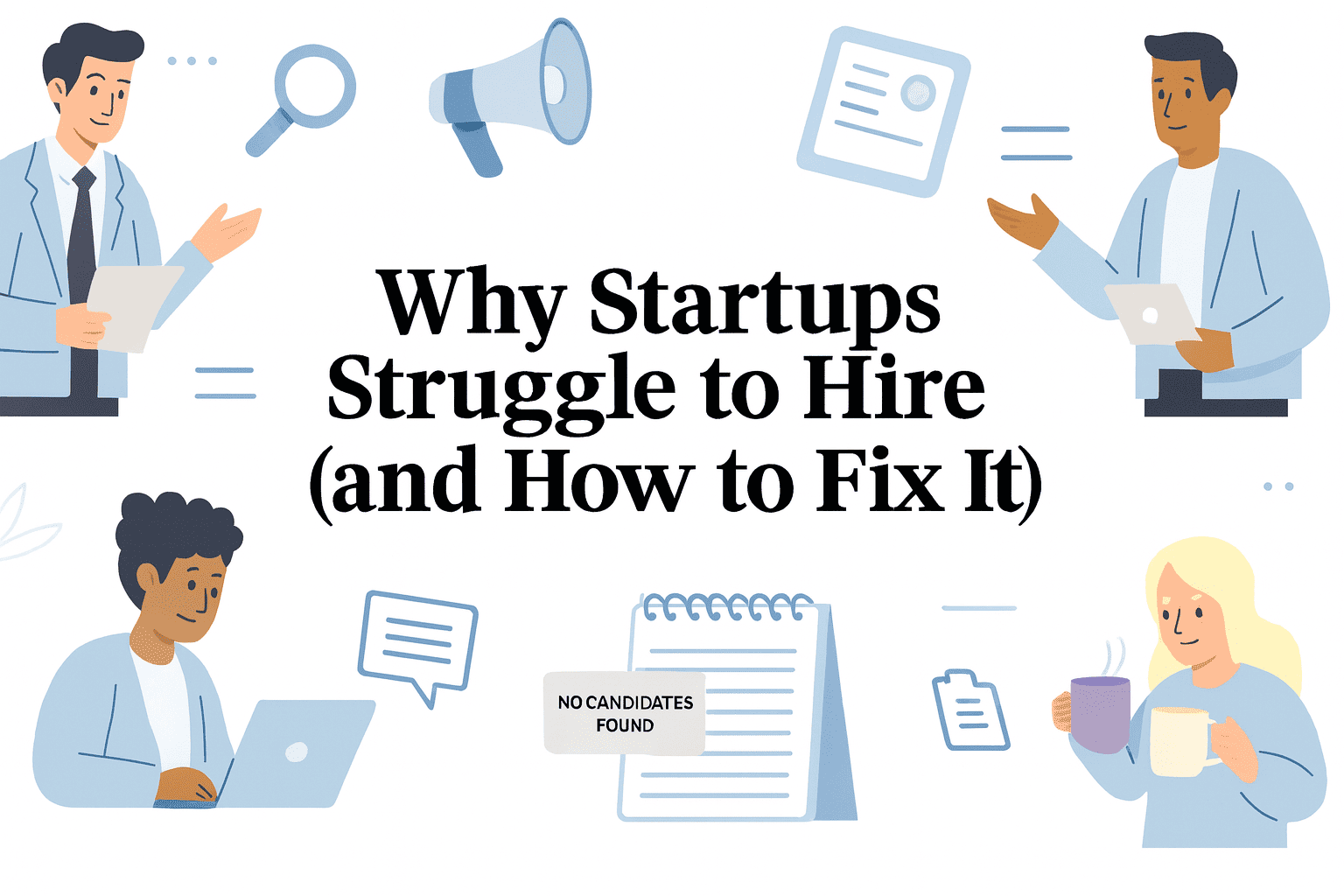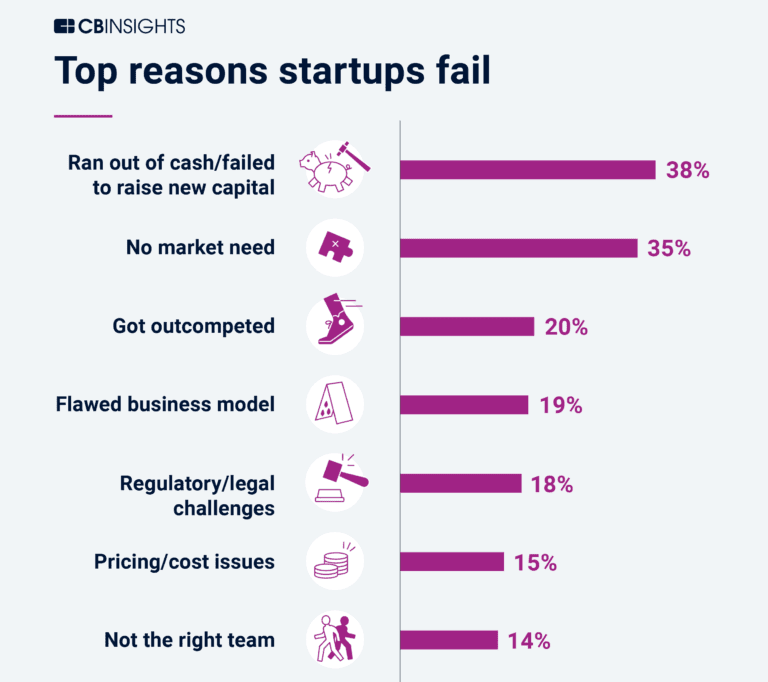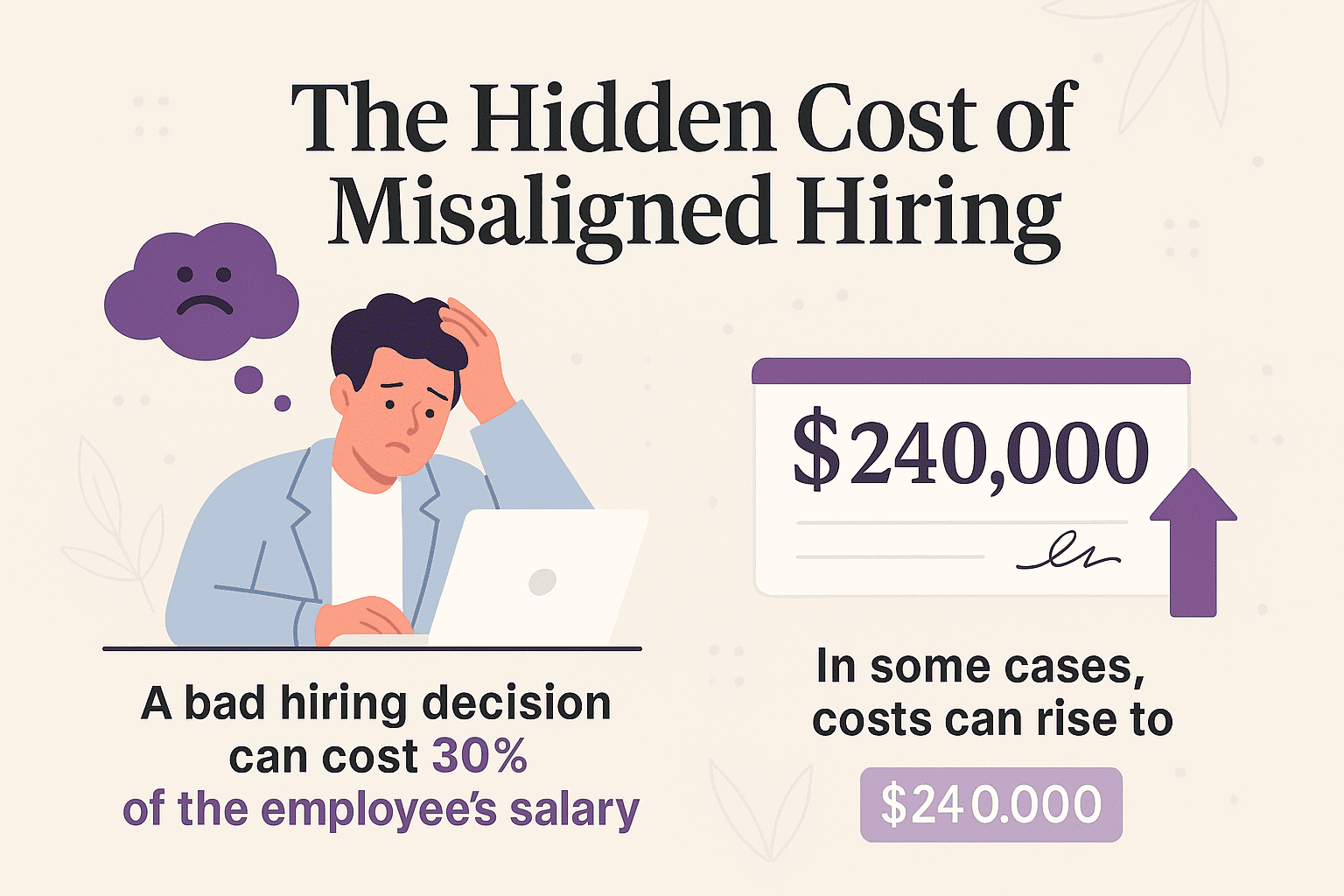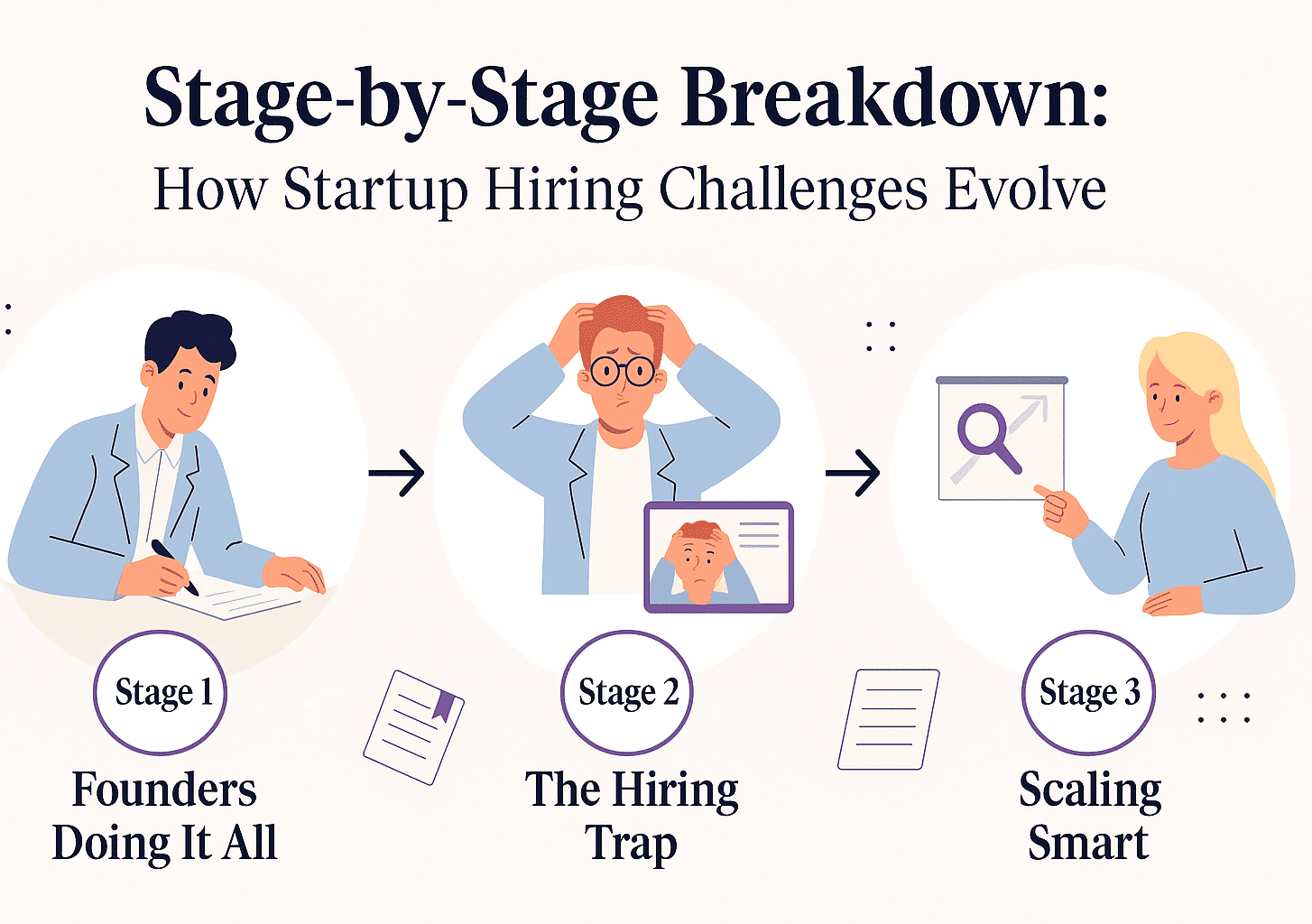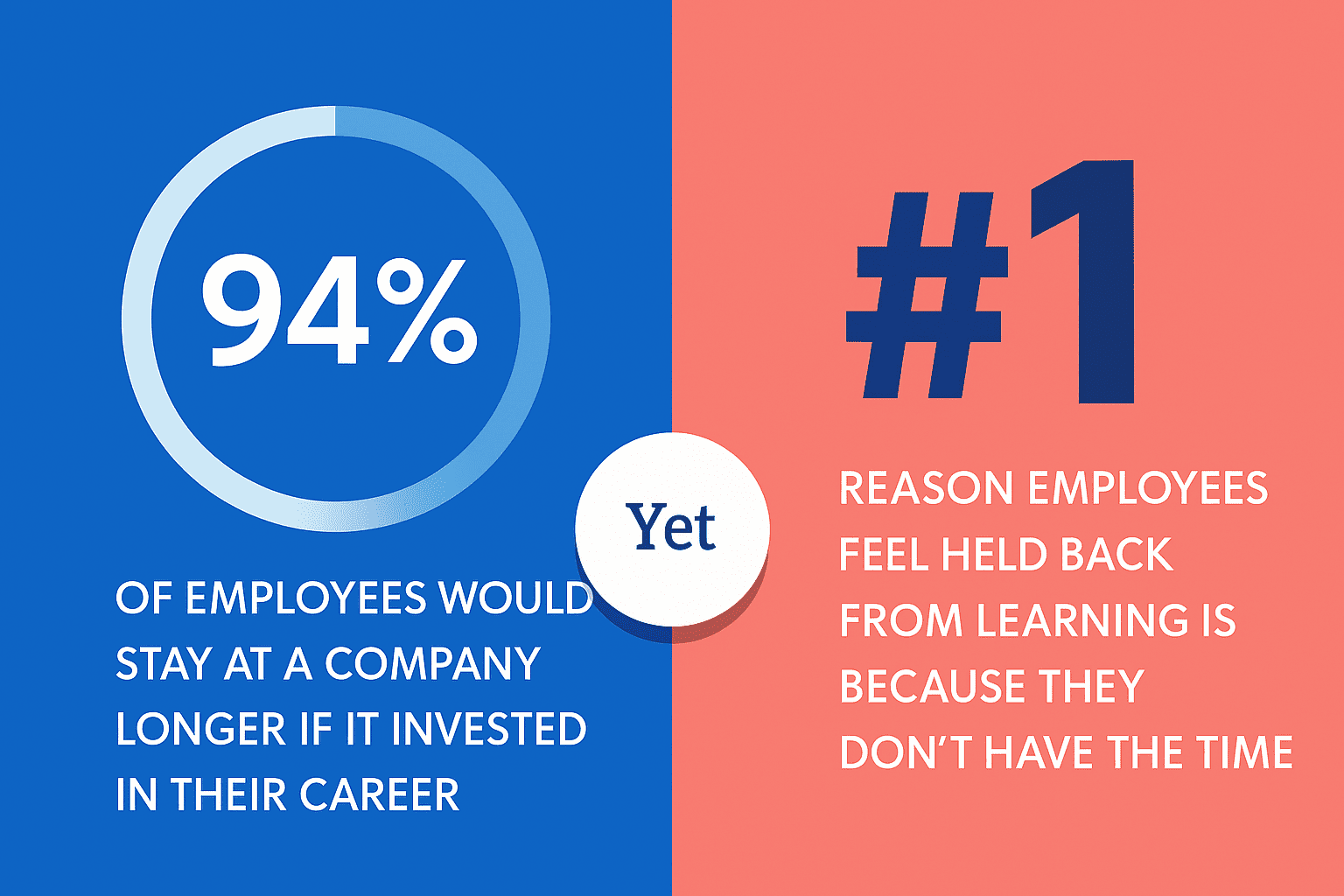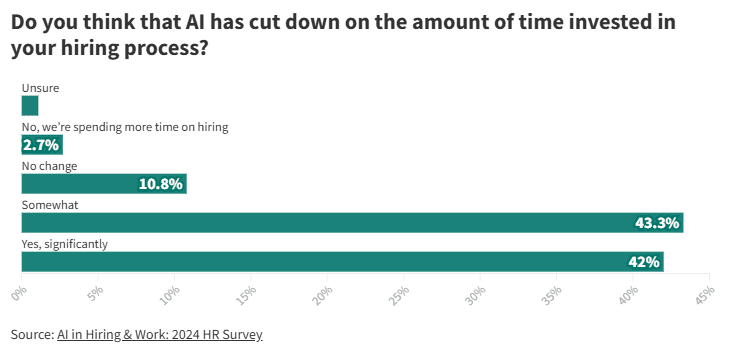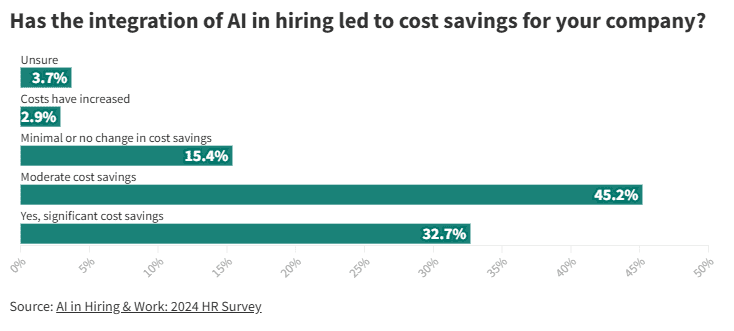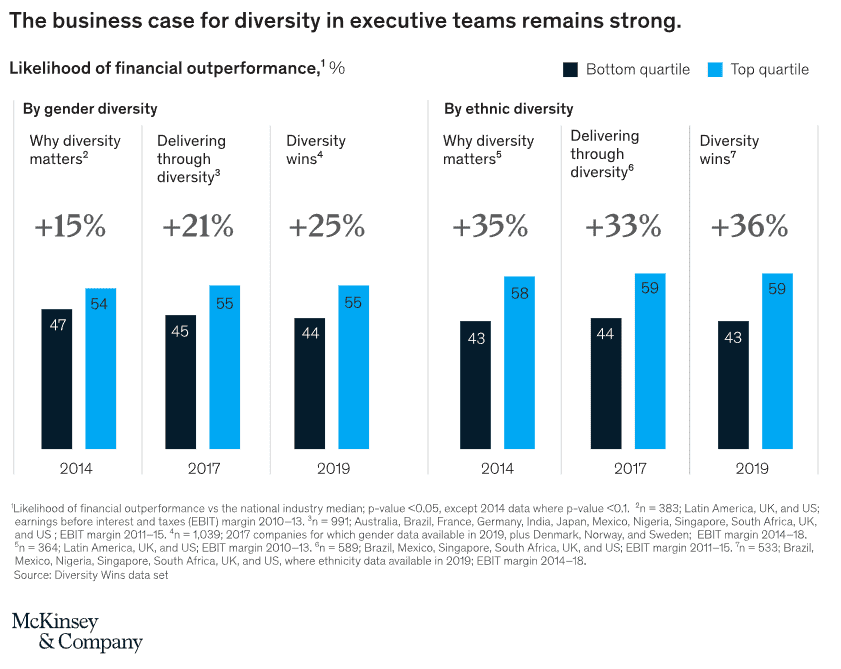Early-stage startups don't fail to hire because talent isn't out there. They fail because the process is slow, unclear, and misaligned with how startups actually operate. Here's how to fix it.
Why Startups Struggle to Hire (and How to Fix It)
Startups struggle to hire because they often lack defined hiring processes, competitive compensation structures, and the operational speed needed to close top talent. When roles and expectations are unclear, candidates drop off, decisions stall, and runway gets wasted, ultimately slowing momentum at the exact moment founders need it most.
Scaling a startup should feel like progress: funding in the bank, vision refined, early traction taking off.
But when it comes to hiring, many founders hit an invisible wall.
You open applications, post on job boards, reach out to friends… and weeks later, you’re still searching. The market feels dry, good candidates vanish overnight, and interviews turn into dead ends.
It’s frustrating, especially when you know hiring should accelerate momentum, not stall it.
Here’s the truth: most early-stage startups don’t fail to hire because of a lack of talent. They fail because they treat hiring like a corporate process instead of what it really is — a test of clarity, speed, and conviction.
If you’re just beginning to build your first technical team, check out our guide on
How to Hire Your First Engineer as a Startup Founder to avoid early hiring pitfalls.
This guide breaks down why early-stage startups struggle to hire and what you can do to fix it.
Why Most Early-Stage Startups Fail to Hire Fast Enough
Early-stage founders face a paradox: they need people to grow, but can’t grow until they have people.
According to
CB Insights, 14% of startups fail because they didn’t have the right team, making it one of the top reasons for startup failure worldwide.
For founders racing toward product-market fit, every unfilled seat means slower progress, missed milestones, and restless investors.
The same small pool of experienced engineers, marketers, and operators is being chased by both startups and tech giants.
Startups can’t compete on compensation, so they must compete on conviction.
If your story, vision, and growth narrative don’t spark belief, top performers will choose safer bets.
Many wait until burnout or investor pressure forces them to scale headcount quickly. The result?
Rushed hires, vague job descriptions, and culture mismatches that slow momentum instead of boosting it.
Founders think they’re moving fast, but candidates see indecision: week-long delays between interviews, unclear next steps, and mixed signals.
Top talent interprets this as disorganization and walks.
SeekLab Insight: Early-stage hiring is all about velocity. Founders who make decisions within five days close 3 times more candidates than those who drag the process to two weeks. SeekLab helps you cut that lag time by matching you instantly with pre-qualified talent built for early-stage pace.
The Hidden Cost of Misaligned Hiring
Hiring the wrong person isn’t just expensive. It’s dangerous.
According to
ADP’s The Cost of a Bad Hire report, a bad hiring decision can cost around 30% of the employee’s salary, and in some cases rise to $240,000 depending on role and industry.
For early-stage startups, though, the heavier toll isn’t just dollars. It’s momentum. Every misaligned hire steals focus, erodes culture, and forces trust to be rebuilt.
When you have 12 months of runway, one wrong hire can shave off two. That’s because early employees shape everything, from code quality to investor confidence.
A single hire misaligned with startup rhythm (speed, adaptability, curiosity) can create drag across the team.
They might demand more structure, resist ambiguity, or lack founder-level ownership. Qualities you can’t train easily.
While you’re rehiring, competitors are shipping features, securing clients, or closing their next round.
“A weak hire doesn’t just slow you down,” says a veteran founder. “It multiplies uncertainty.”
Avoid the “hire to fix pain” mentality.
Before filling a seat, define the problem: What’s the bottleneck? What does success look like?
Then test fit through a small paid project or trial sprint: the fastest, lowest-risk way to confirm alignment before you commit.
Stage-by-Stage Breakdown: How Startup Hiring Challenges Evolve
Every startup’s hiring story evolves through three stages.
Each stage brings new pressures, blind spots, and decisions that can either accelerate growth or quietly sabotage it.
The mistake? Treating every stage the same.
At this stage, hiring feels optional.
You’re still in scrappy mode. Pulling 12-hour days, juggling product and customers yourself.
Referrals are your default: friends, ex-coworkers, anyone who can code or sell fast enough to survive. It works, until it doesn’t.
This phase often hides the earliest hiring trap: founder over-dependence.
Because roles often blur together, founders wait too long to bring in outside help, assuming “it’s faster if I just do it myself.”
But by the time you need people, you’re already weeks behind.
You’re hiring reactively. Not strategically.
SeekLab Insight: Use this stage to test-fit your hiring process early. Even two or three part-time hires give you real data about what kind of talent thrives in your environment, so you’re not guessing when you scale.
After raising a seed or Series A, founders suddenly feel the pressure to grow.
Investors expect traction. You need people yesterday.
But urgency can lead to overcorrection: too many hires, too little structure.
Startups at this phase often:
• Write vague job descriptions (“we need a marketing generalist”)
• Hire for pedigree instead of adaptability
• Mistake activity for progress
The result? You scale chaos instead of clarity. Founders soon realize that adding more people didn’t speed things up. It multiplied confusion.
Fix: Hire for clarity, not comfort.
Before you post another job, define one measurable outcome each new hire should own. If you can’t clearly describe how their success will be measured, you’re not ready to fill that seat.
Once product-market fit clicks, your challenge shifts from “getting help” to “building a system.” Now, it’s not about hiring more, it’s about hiring right.
Here’s where top-performing startups create leverage:
• They introduce lightweight hiring frameworks
• Track performance by outcomes, not hours
• Hire people who scale their culture, not just fit it
SeekLab works especially well at this inflection point. When founders want to build repeatable hiring momentum without sacrificing speed. We connect early-stage teams with candidates already vetted for startup ambiguity, adaptability, and ownership mindset.
That’s how you move fast and build well.
The Cultural Fit Challenge: Startup Chaos vs. Corporate Order
If there’s one word founders overuse in hiring, it’s “fit.”
But cultural fit doesn’t mean hiring people you’d grab coffee with: it means hiring people who can thrive in your level of chaos.
Startups run on uncertainty.
Roadmaps change weekly, priorities shift overnight, and “we’ll figure it out” becomes a company motto. For many corporate-trained professionals, that’s not excitement. It’s anxiety.
This is where most mismatches happen: Founders assume high skill equals high adaptability. But experience doesn’t always translate to resilience.
It slows decisions: corporate hires may expect formal sign-offs instead of quick calls.
It kills morale: founders feel frustrated managing expectations.
It triggers turnover: many “great on paper” hires leave within months.
Be brutally transparent during hiring. Talk about what “chaos” actually means in your startup. If you pivot every two weeks, say it.
Interview for adaptability, not just ability. Ask: “Tell me about a time you had to deliver without clear direction.”
Test with a real project. A one-week trial sprint will show how they operate under uncertainty better than five interviews ever could.
How to Future-Proof Your Early Hiring Strategy
One of the most common founder regrets isn’t who they hired. It’s when and why they did. Early hires often solve today’s bottleneck but create tomorrow’s constraints.
If you only hire for your current stage, you’ll find yourself rebuilding your team every time you grow.
At this stage, the best hires aren’t experts in one thing. They’re curious generalists who evolve as the startup does.
A marketing hire today may become your growth strategist tomorrow. A full-stack developer could evolve into a product lead.
That makes early hires who are adaptable, curious, and able to own change far more valuable than specialists who expect more structure than an early-stage startup can provide.
Ask during interviews:
“What’s a skill you learned recently that wasn’t part of your job?”
The right candidates light up at that question.
Training often feels like a luxury in early startups but skipping it guarantees turnover.
According to
LinkedIn’s 2018 Workplace Learning Report,
94% of employees say they would stay at a company longer if it invested in their career development. The earlier you build a feedback and growth loop, the easier it becomes to retain your best people through scale.
Start simple: peer mentorship, open feedback rituals, short learning sprints. Momentum grows from the inside out.
If your hiring process depends on founder intuition, it won’t scale.
You need systems that turn intuition into insight: simple scorecards, standardized evaluations, candidate databases.
The Role of AI and Data in Startup Hiring
AI isn’t replacing recruiters. It’s replacing recruitment inefficiency.
Startups now use AI tools to screen resumes, predict performance fit, and even analyze soft-skill signals during interviews.
When used right, AI helps early-stage teams compete with larger companies, doing more with fewer resources.
According to
Workable’s 2024 AI in Hiring and Work survey, the majority of hiring professionals say AI has made a measurable impact on efficiency.
Around 85% report that AI has reduced the time spent on hiring, with 42% saying it has significantly shortened the process and 43% noting moderate improvements.
Additionally, nearly 80% of companies report moderate or significant cost savings from integrating AI into their hiring workflows.
For early-stage startups, that kind of speed and precision can be the difference between capturing opportunity and missing it.
AI doesn’t just speed things up, it clarifies what works.
With each hire, you collect data on performance, retention, and culture fit.
This lets you see patterns: which candidate traits predict success, which interview steps add no value, which sources yield the best people.
The result? You stop guessing and start hiring intentionally. That’s how small startups outpace slower, better-funded competitors. By turning hiring from guesswork into growth science.
Why DEI Matters from Day One
Diversity, equity, and inclusion (DEI) aren’t “later-stage” priorities. They’re early-stage advantages.
Startups with diverse founding teams aren’t just doing the right thing. They’re building stronger businesses.
According to
McKinsey’s “Diversity Wins: How Inclusion Matters” report, companies in the top quartile for gender diversity on their executive teams are
25% more likely to achieve above-average profitability.
For ethnic and cultural diversity, that performance gap jumps to
36%.When you bake inclusion into your foundation, it compounds over time, influencing creativity, decision-making, and even your ability to attract top talent.
The culture you create early becomes the culture people replicate later.
When everyone thinks alike, innovation stalls. Different perspectives expose blind spots faster and in early-stage environments, catching mistakes early is your greatest efficiency.
Today’s candidates actively research companies’ diversity values before applying.
Startups that bake inclusion into their messaging attract broader, stronger talent pools. Simple steps like removing gender-coded language from job posts or including diverse interview panels make a measurable difference.
If your outreach looks the same every time, your hires will too.
Startups often recruit from the same handful of networks, portfolios, or alumni groups. Not out of bias, but habit. But that sameness limits both perspective and reach.
True diversity starts upstream, with how you source talent and where you show up.
Broaden the funnel, and you broaden the ideas.
Post roles in founder communities outside your usual circles. Partner with accelerators that support underrepresented founders or operators. Ask your current team who’s missing from the table and why.
This isn’t about optics; it’s about performance. Teams built on different life experiences see problems sooner and solve them faster. In a startup, that’s not just moral good. That's a strategic advantage.
Scaling Smart: Building Momentum Through Alignment
Scaling isn’t about hiring more people. It’s about creating alignment that compounds.
When you get hiring right, every new teammate multiplies clarity, not confusion. Your roadmap moves faster because everyone’s rowing in the same direction.
But when you rush it, growth turns brittle. Decisions take longer, priorities fragment, and your once-tight vision starts to blur.
At that point, founders often ask, “How do we get back to what worked early on?”
The answer is simple but not easy: go back to alignment.
The best teams don’t just share goals; they share context, conviction, and rhythm.
They understand why decisions are made, not just what they are. And that’s the foundation every early-stage company should protect as it grows.
The Lesson: Hire for Alignment, Not Relief
Most founders hire because they feel stuck. They’re tired, stretched thin, and think an extra set of hands will solve the problem.
But the right hire doesn’t just take work off your plate. They expand what’s possible and make your company smarter, faster, and more focused.
When you hire for alignment instead of urgency, you don’t just move faster. You build a company that knows why it’s moving.
“Speed is a byproduct of clarity. Clarity comes from people who believe in where you’re going.”
SeekLab aims to help you find those people: startup-fit, impact-driven, and ready to build through uncertainty. Because when your team believes in your mission as much as you do, speed takes care of itself. Learn more about how
SeekLab’s hiring platform helps founders move fast by connecting them with pre-vetted, startup-ready talent.
Startup Hiring FAQ
Most founders move too fast without defining the problem they’re actually hiring to solve. Without clarity on roles, goals, or culture, even great candidates walk away.
You can’t outpay them, but you can out-inspire them. Startups win by offering impact, ownership, and growth that corporate jobs can’t match.
Generalists who are curious, adaptable, and resourceful. People who see ambiguity as opportunity, not risk.
As soon as you start seeing repeatable patterns in what works — usually around the time you make your third or fourth hire.
SeekLab combines human expertise and AI-matched talent data to connect you with pre-vetted candidates ready for early-stage chaos. It’s how founders move from hiring reactively to building strategically.
Hiring Doesn't Have to Slow You DownWe help founders hire startup-ready talent fast — without bloated processes, guesswork, or wasted runway.
